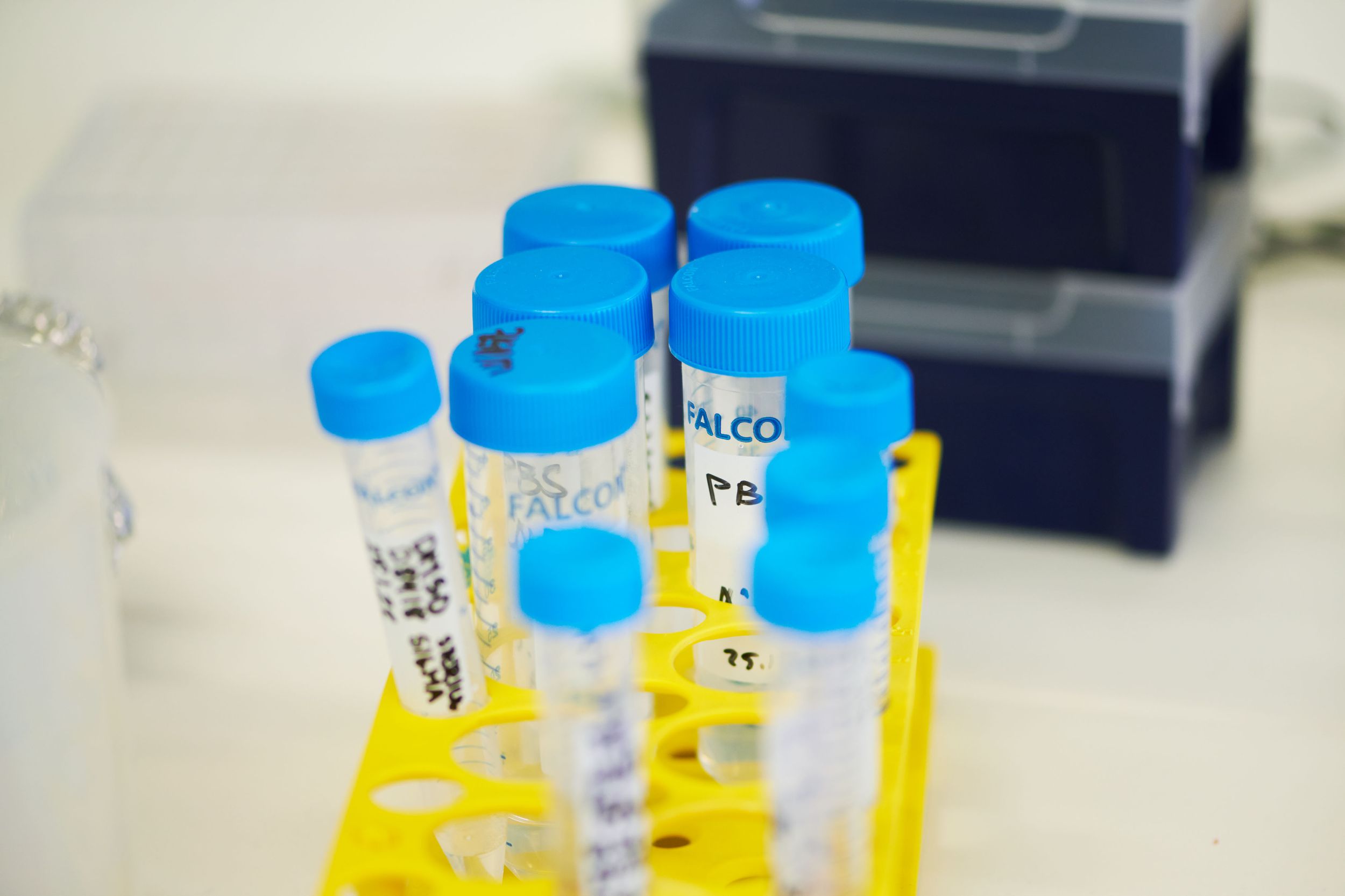
Research
Research groups
Stem cells and regeneration
Stem cells are responsible for regeneration in various organs. For example, blood stem cells, which are found in the bone marrow, provide all blood cells throughout life. These blood stem cells are already created during embryonic development. Despite various protective mechanisms, stem cells can suffer damage over time - especially after exposure to certain toxic substances or with increasing age - for example in the form of so-called "genetic changes" or "mutations" that alter their genetic material. In unfavorable cases, such damage confers growth advantages and allows damaged cells to spread in the bone marrow, while existing healthy cells are displaced. If further mutations are added or the bone marrow environment is damaged by the altered cells, leukemia can develop. Similar mechanisms probably take place during tumor development in other stem cell-containing organs, but are generally less well studied here.
Our research group focuses on the study of stem cells in regeneration and tumor biology. We study how stem cells arise during development, survive later in the bone marrow, and here - in the case of cancer - interact with the bone marrow and the cancer cells. We are particularly interested in leukemia diseases and in certain gene alterations that indicate an unfavorable clinical course in patients with leukemia (e.g. concerning the stem cell gene EVI1). Using various research models, we are analyzing the effects of these genetic changes on the leukemia cells themselves and on their interaction with healthy stem cells and the environment. In leukemias, but also in other cancers (e.g. breast and ovarian cancer), we investigate how tumor cells use stem cell properties to induce cancer and protect themselves from conventional chemo- or radiotherapies and the body's own immune surveillance.
By gaining a deeper understanding of these processes, our aim is to develop novel therapies that are also effective against resistant tumor cells with stem cell properties.
Immunotherapy
Our immune system not only keeps a number of microbial pathogens in check, it is also constantly working to identify and eliminate degenerated body cells, so-called cancer cells. But like some bacteria and viruses, which are able to outwit our immune system as part of their survival strategy, tumors also develop mechanisms to subvert the function of the immune system and avoid being detected by it. If immune cells have nevertheless invaded the area surrounding a tumor or even the tumor itself, a tumor can "disarm" the once aggressive killer cells so that they can no longer attack it. And this is precisely where modern immunotherapy comes in. So-called therapeutic monoclonal antibodies are able to "arm" such killer cells again. These antibodies bind to inhibitory receptors on a killer cell and thus prevent them from transmitting "negative" signals that are responsible for the loss of function of the killer cells. At best, the killer cells can then trigger the cell death of the cancer cell again.
We can offer our patients the latest active substances from the field of immunotherapy as part of clinical programs. Patients with a wide variety of cancers can be enrolled in clinical trials at our tumor center to give them access to cutting-edge agents. As part of our Phase I unit, we offer our patients access to drugs that are still in clinical development and are not available as part of a "standard treatment".
According to the latest scientific findings, the success of such immunotherapy depends on how many and, above all, which immune cells are present in the tumor. We are therefore developing test systems in the laboratory that enable us to better predict the effectiveness of new immunotherapies and thus facilitate the search for the optimal therapy or combination of therapies. In the spirit of personalized medicine, it will be possible in the future to use the immune cells in the tumour and additional biomarkers to estimate which immunotherapy will work best for each individual patient and what their chances of success are. This is because what happens in the tumor microenvironment between the tumor and immune cells has a dramatic influence on tumor growth and the success of the therapy.
Another important branch of research is concerned with how immunotherapy can be optimally integrated into existing oncological treatments. It is hoped that immunotherapy will be even more effective if it is used in conjunction with other therapies. Our research has shown that acquired resistance to individual drugs can be avoided if immunotherapies with different mechanisms of action are administered simultaneously. The tumor can thus be pushed back more effectively. Immunotherapy can also be given in combination with conventional chemotherapy or radiotherapy. We were able to show that certain chemotherapies stimulate the immune system and can therefore be ideally combined with immunotherapy. Another important combination is the simultaneous administration of immunotherapies with so-called anti-angiogenic substances, i.e. drugs that inhibit the excessive formation of blood vessels in the tumor triggered by the tumor. These tumor's own blood vessels supply the tumor with nutrients and oxygen, but differ from "normal blood vessels" in that they only allow immune system defense cells limited access to the tumor. Initial results show that immunotherapy, when administered simultaneously with these anti-angiogenic substances, achieves significantly better therapeutic success. The immune cells can now reach the tumor cells more easily and destroy them.

Prof. Alfred Zippelius
Co-Chefarzt
Medizinische Onkologie FMH, Mitglied Tumorzentrum, Leiter Labor Tumorimmunologie
Hauttumore, Thoraxtumore, Immuntherapie
Ovarian cancer
Our research interests focus on gynecological cancers in general and ovarian cancer in particular. (Epithelial) ovarian carcinoma has the highest mortality rate of all gynecological malignancies, as 75 percent of patients are only diagnosed at an advanced stage due to the lack of symptoms. Our research aims to find methods and means to detect this disease as early and reliably as possible and to find the best therapy for each patient in terms of personalized medicine, to better identify risk groups and, last but not least, to look for new, more effective and cost-effective forms of therapy. Our research ranges from basic research to transnational and patient-oriented research, including the conduct of clinical trials.
The focus of patient-oriented research is on the evaluation of new therapeutic options and research projects to optimize diagnosis, therapies and surgical processes and to improve the quality management and cost-effectiveness of interventions and treatments: so that each patient can be offered the therapy and treatment that will benefit her the most and which has a balanced cost-benefit ratio. This research is carried out within the framework of retrospective and prospective multi-center clinical studies, i.e. in collaboration with local, national and international research institutions and hospitals.
One of our focal points is research into the molecular cause(s) of this disease. Although it is now recognized that this is a heterogeneous disease, patients are usually treated with "the standard therapies". Identifying the molecular causes (signatures) of this heterogeneity will help us to find the most optimal, i.e. "tailor-made" therapy or treatment for each patient or group of patients in the future. This also includes finding new and, above all, more reliable methods and indicators, e.g. so-called tumor or biomarkers, for the early detection of this disease. For this research, we benefit from our extensive biobanks with blood and tissue samples from national and international cohorts.
One of our focal points is glycobiology, i.e. we use our specially developed array platforms to investigate the role and function of glycans (sugar molecules) in the development and progression of ovarian cancer and their functions in the immune response, first in cell line models and then in small animal models. These glycans occur in diverse structural variants on practically all proteins and lipids in all cells and perform essential biological functions for the cells. Interestingly, certain glycan structures are only found in carcinoma cells, suggesting that they have a carcinoma-specific function. There is also some evidence that the concentration of antibodies against certain glycan structures, so-called antiglycan antibodies, differs in the blood serum of patients and healthy women: which could mean that certain glycans have tumor or biomarker properties and could even serve as target molecules for immunotherapies, for example. Such antiglycan antibodies are also found in the breast milk of breastfeeding mothers and in urine: the biological function of these antibodies is largely unknown and is also the subject of our research.

Prof. Viola Heinzelmann-Schwarz
Co-Leiterin Frauenklinik
Chefärztin Gynäkologie/Gyn. Onkologie
Further information
Studies
Participation in studies
The aim of clinical trials is to improve the detection and treatment of cancer. They make an important contribution to progress in many very different areas - from early detection and the latest new treatment methods to support measures for patients and relatives (stress management, exercise, etc.).
As a study participant, you can be sure that you will be treated according to the latest scientific findings and under strict, multi-stage quality control. All studies have been reviewed and approved by the Basel Ethics Committee. Participation in studies is generally voluntary.
The University Hospital offers the opportunity to actively participate in clinical trials. If you are interested in participating in a study, please ask your attending physician whether a study is open for your specific disease.
Answers to frequently asked questions regarding participation in clinical trials can be found at the Oncology Department.
Various tumors / Phase I studies
DODEKA
A Phase I study to assess the safety and early signs of efficacy of the human monoclonal antibody-cytokine fusion protein IL12-L19L19.
Contact: Prof. Heinz Läubli
IMC-F106C-101
A phase I/II study of the safety and efficacy of IMC-F106C as a single agent and in combination with immunotherapy in HLA-A*02:01-positive participants with advanced PRAME-positive cancers.
Contact: Dr. Anton Oseledchyk
ISCA-CHECK
Safety and modulation of adaptive immunity by Iscador® Qu Viscum Album extract in patients with advanced, recurrent or metastatic cancer treated with immune checkpoint inhibitors.
Contact: Prof. Mascha Binder
Breast Center
POLAR - A phase III open-label, multicenter, randomized trial of adjuvant palbociclib in combination with endocrine therapy versus endocrine therapy alone for patients with hormone receptor positive / HER2-negative resected isolated locoregional recurrence of breast cancer
BREAST CANCER, HR-positive, HER2-negative, 2nd line
Principal Investigator
David Thorn
Contact: praxis.langegasse78@hin.ch
DESTINY-Breast12: An Open-Label, Multinational, Multicenter, Phase 3b/4 Study of Trastuzumab Deruxtecan in Patients With or Without Baseline Brain Metastasis With Previously-Treated Advanced/Metastatic HER2-Positive Breast Cancer
Principal Investigator
Christian Kurzeder
Contact: christian.kurzeder@usb.ch
SAKK 23/16: TAXIS - Multicenter phase III study, determination of optimal axillary therapy (surgery vs. radiotherapy) for regional, lymphonodular metastatic breast cancer
Principal Investigator
Walter Weber
Contact: walter.weber@usb.ch
Gynecological Tumor Center
Contact: studien.gynaekologie@usb.ch
Principal Investigator
Prof. Viola Heinzelmann
MATAO:
MAintenance Therapy with Aromatase inhibitor in epithelial Ovarian cancer: a randomized double-blinded placebo-controlled
multi-center phase III Trial (ENGOT-ov54/Swiss-GO-2/MATAO) including LOGOS (Low Grade Ovarian cancer Sub-study)
MK-2870-020:
A Phase 3 Randomized, Active-controlled, Open-label, Multicenter Study to Compare the Efficacy and Safety of MK-2870 Monotherapy Versus Treatment of Physician's Choice as Second-line Treatment for Participants with Recurrent or Metastatic Cervical Cancer (MK-2870-020/GOG-3101/ENGOT-cx20
Brain Tumor Center
GLIOSUN, Philogen - A Study to Evaluate the Safety and Efficacy of the Tumor-targeting Human Antibody-cytokine Fusion Protein L19TNF
Plus Standard Temozolomide Chemoradiotherapy in Patients With Newly Diagnosed Glioblastoma
Principal Investigator
Dr. Benjamin Thiele
Contact: benjamin.thiele@usb.ch
GLUGLIO, University of Zurich - A Phase Ib/II Randomized, Open Label Drug Repurposing Trial of Glutamate Signaling Inhibitors in Combination With
Chemoradiotherapy in Patients With Newly Diagnosed Glioblastoma
Principal Investigator
Heinz Läubli
Contact: heinz.laeubli@usb.ch
Lung Tumor Center
ETOP 23-22 RAISE
A phase II study to investigate the effect of niraparib and immunotherapy in patients with SLFN11-positive small cell lung cancer.
Contact: Dr. Andreas Schmitt
AMGEN 20240178
A phase III study of first-line treatment with tarlatamab in combination with durvalumab, carboplatin and etoposide compared to durvalumab, carboplatin and etoposide in untreated advanced small cell lung cancer (DeLLphi-312).
Contact: Dr. Andreas Schmitt
Early and locally advanced stage
ETOP 25-23 ADOPT
A phase III study to evaluate the benefit of adjuvant durvalumab treatment after neoadjuvant chemotherapy plus durvalumab in patients with operable stage IIB-IIIB (N2) non-small cell lung cancer.
Contact: Dr. Andreas Schmitt
PACIFIC-8
A phase III study of durvalumab in combination with domvanalimab versus durvalumab and placebo in patients with locally advanced (stage III), inoperable non-small cell lung cancer whose disease has not progressed after definitive platinum-based radiochemotherapy.
Contact: Dr. Benjamin Thiele
Advanced stage first line
TROPION-Lung 08
A phase III study of Dato-DXd plus pembrolizumab compared to pembrolizumab alone in untreated study participants with advanced or metastatic non-small cell lung cancer with high PD-L1 levels (≥ 50%), without targetable genomic alterations.
Contact: Dr. Benjamin Thiele
Krascendo 170 Lung
A Phase IB/II study to evaluate the safety and efficacy of GDC-6036 at various doses in combination with other cancer therapies in patients with previously untreated advanced or metastatic non-small cell lung cancer with a KRASG12C mutation.
Contact: Dr. Andreas Schmitt
CA224-1093
A phase III study of the combination of nivolumab + relatlimab with chemotherapy versus pembrolizumab with chemotherapy as first-line treatment for participants with stage IV or recurrent non-squamous non-small cell lung cancer and with tumor cell PD-L1 expression ≥ 1%.
Contact: Dr. Andreas Schmitt
CTL-002-003
A phase II study to evaluate the efficacy and safety of visugromab compared to placebo in combination with pembrolizumab, pemetrexed and carboplatin in the first-line treatment of participants with metastatic non-squamous non-small cell lung cancer.
Contact: Dr. Benjamin Thiele
Advanced stage second and further lines
AMGEN 20230153
A phase II study to evaluate the efficacy, safety, tolerability and pharmacokinetics of AMG 193 in patients with previously treated advanced non-small cell lung cancer with deletion of the MTAP gene (MTAP).
Contact: PD Dr. Benjamin Kasenda
BaseTIL-02 - A phase II trial of adoptive cell therapy with tumor-infiltrating lymphocytes in patients with non-small cell lung cancer.
Contact: Prof. Heinz Läubli
Lymphomas (non-Hodgkin's)
Relapsed/refractory
NX-5948-301
A phase I study to evaluate the safety and efficacy of NX-5948, a Bruton's tyrosine kinase (BTK) degrader, in patients with relapsed/refractory B-cell malignancies.
Contact: PD Dr. Benjamin Kasenda
CA123-1000
A phase I/II study of BMS-986458 alone or in combination with anti-lymphoma agents in relapsed/refractory non-Hodgkin lymphoma.
Contact: Dr. Fatime Krasniqi
Melanomas
TIL therapy (here the treatment is not part of a trial, but is carried out via a temporary authorization)
An adoptive cell therapy with tumor-infiltrating lymphocytes and interleukin-2 in patients with advanced melanoma.
Contact: Prof. Heinz Läubli
Mesothelioma
eVOLVE-Meso
A phase III study with Volrustomig in combination with chemotherapy compared to chemotherapy alone in inoperable pleural mesothelioma.
Contact: Dr. Benjamin Thiele
Sarcomas
SAKK 57/24
Feasibility of overall neoadjuvant treatment with hyperthermia in patients with high-risk soft tissue sarcomas of the extremities and trunk.
Contact: Dr. Fatime Krasniqi
Urological Tumor Center
Prostate carcinoma
ProBio
A Biomarker Driven Study in Patients With Metastatic Prostate Cancer (ProBio)
Contact: frank.stenner@usb.ch
MK2400-001
A phase III trial comparing ifinatamab deruxtecan with docetaxel in participants with metastatic castration-resistant prostate cancer (mCRPC).
Contact: Prof. Frank Stenner
Center for Hemato-Oncology
INCMOR0208-301 - A Phase 3 Study to Assess Efficacy and Safety of Tafasitamab Plus Lenalidomide and Rituximab Compared to Placebo Plus Lenalidomide and Rituximab in Patients With Relapsed/Refractory (R/R) Follicular Lymphoma or Marginal Zone Lymphoma.
LYMPHOMA, Follicular Lymphoma
Principal Investigator
Fatime Krasniqi
Contact: Fatime.Krasniqi@usb.ch
SGN35-031 Echelon-3 - A Randomized, Double-blind, Placebo-Controlled, Active-Comparator, Multicenter, Phase 3 Study of Brentuximab Vedotin or Placebo in Combination With Lenalidomide and Rituximab in Subjects with Relapsed or Refractory Diffuse Large B-cell Lymphoma (DLBCL)
LYMPHOMA, Diffuse Large B Cell Lymphoma, relapsed or refractory
Principal Investigator
Frank Stenner
Contact: frank.stenner@usb.ch
Priothera - A prospective randomized, double-blind, placebo-controlled, multi-center phase III study to evaluate the efficacy and safety of mocravimod as an adjunctive and maintenance treatment in adult acute myeloid leukemia (AML) patients undergoing allogeneichematopoietic cell transplantation (HCT).
Principal Investigator
Francesca Matteazzi
Contact: Francesca.Matteazzi@usb.ch
Swiss Soliris® and Ultomiris® Reimbursement Registry SSURR - An observational registry for capturing data of patients suffering from paroxysmal nocturnal hemoglobinuria (PNH) who are treated with Soliris® (eculizumab) or Ultomiris® (ravulizumab).
Principal Investigator
Dominik Heim
Contact: dominik.heim@usb.ch
EMN30/ MajesTEC-4 - Phase 3 Study of Teclistamab in Combination With Lenalidomide and Teclistamab Alone versus Lenalidomide Alone in Participants With Newly Diagnosed Multiple Myeloma as Maintenance Therapy Following Autologous Stem Cell Transplantation.
Principal Investigator
Dominik Heim
Contact: dominik.heim@usb.ch
Haplo NK-DLI Study - A Phase I/II single center study to assess the safety, tolerability and feasibility of pre-emptive immunotherapy with in vitro expanded natural killer cells in patients treated with haploidentical stem cell transplantation for AML/MDS.
Principal Investigator
Jakob Passweg
Contact: jakob.passweg@usb.ch
IPIG- Register - The International PNH (Paroxysmal Nocturnal Hemoglobinuria) Interest Group Registry
Prinicipal Investigator
PD Dr. Drexler Beatrice
Contact: Beatrice.Drexler@usb.ch
Center for skin tumors
Imlygic (Amgen 20130193) - A Postmarketing Prospective Cohort Study of Melanoma Patients Treated With IMLYGIC® (Talimogene Laherparepvec) in Clinical Practice to Characterize the Risk of Herpetic Infection Among Patients, Close Contacts, and Health Care Providers; and Long-term Safety in Treated Patients
MELANOMA
Principal Investigator
Heinz Läubli
Contact: heinz.laeubli@usb.ch
Center for Neuroendocrine and Endocrine Tumors
LUMED - 177Lu-PP-F11N for Receptor Targeted Therapy and Imaging (Theranostics) of Metastatic Medullary Thyroid Cancer - a Pilot and a Phase I Study.
Principal Investigator
Christof Rottenburger
Contact: christof.rottenburger@usb.ch
NCT05359146 - Combined Beta- Plus Auger Electron Therapy Using a Novel Somatostatin Receptor Subtype 2 Antagonist Labeled With Terbium-161 (161Tb-DOTA-LM3) (Beta plus)
Principal Investigator
Julia Fricke
Contact: julia.fricke@usb.ch
NCT03049189 - A Prospective, Randomized, Controlled, Open-label, Multicentre Phase III Study to Evaluate Efficacy and Safety of Peptide Receptor Radionuclide Therapy (PRRT) With 177Lu-Edotreotide Compared to Targeted Molecular Therapy With Everolimus in Patients With Inoperable, Progressive, Somatostatin Receptor-positive (SSTR+), Neuroendocrine Tumors of Gastroenteric or Pancreatic Origin (GEP-NET)
Principal Investigator
Damian Wild
Contact: damian.wild@usb.ch
"If NETest were the test" - Improving clinical care with a newly developed biomarker (NETest) in patients with neuroendocrine tumors
Principal Investigator
Alin Chirindel
Contact: alin.chirindel@usb.ch
NCT06455358 - 61Cu-NODAGA-LM3 PET/CT for the Detection of Neuroendocrine Tumors (COPPER PET in NET)
Principal Investigator
Guillaume Nicolas
Contact: guillaume.nicolas@usb.ch
